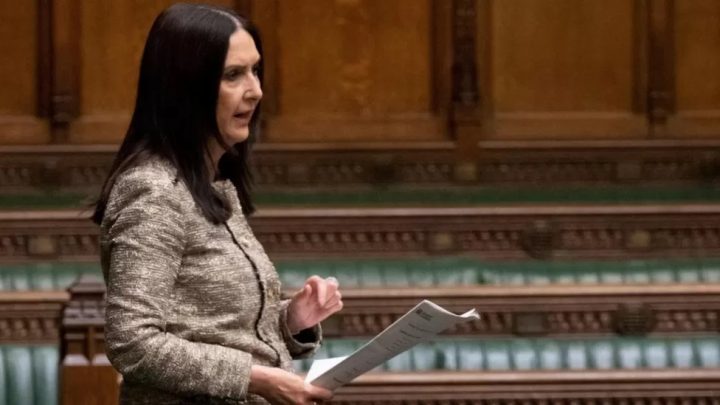Margaret Ferrier has received a 30-day suspension from the Commons for breaching the Code of Conduct for MPs when she broke Covid rules. As the suspension is for longer than ten days, she is now at the mercy of a recall petition and by-election: it’s almost certain that the constituents of Rutherglen and Hamilton West will soon have a new MP. Unusually, 40 MPs voted against the suspension (185 voted in favour), and a high number of abstentions were recorded.
Ferrier was sentenced to 270 hours of unpaid work in September last year after she pleaded guilty in a Scottish court to culpable and reckless conduct. Having discovered she was positive for Covid, Ferrier took a train from Westminster to Glasgow during the pandemic. The Standards Committee concluded that Ferrier – who was suspended by the SNP – had ‘knowingly and recklessly exposed members of the public and those on the parliamentary estate to the risk of contracting Covid’. She was also accused of acting ‘dishonestly’ and causing ‘significant damage to the reputation of the House’.
Ferrier appealed against the suspension to the Independent Expert Panel – a new independent body headed by a former senior judge, and which contains no MPs – but her appeal was dismissed in a fairly peremptory fashion last month. The three-person sub-panel (chaired by Sir Peter Thornton KC) concluded that none of her grounds of appeal had substance.
MPs should think hard about the risk that parliament may, once again, become re-contaminated by claims of sleaze
At first glance, this may all appear completely unremarkable. But her case has exposed some significant disquiet from some MPs about how the standards processes are working in practice.
Four members of the Standards Committee (including senior Conservatives Sir Bernard Jenkin and Sir Charles Walker) voted against the sanction imposed on Ferrier. They unsuccessfully called for her to be suspended for nine days, with just her salary suspended for 30 days. The recommendation for a full 30-day suspension from the Commons was only carried with the support of the lay members of the Committee.
In a bombshell final sentence, the Committee said that in recommending the sanction it had ‘to take account of the effect of the Recall of MPs Act 2015’ and the fact that the recommended sanction would trigger the possibility of recall. It concluded that the operation of the 2015 Act ‘requires review’.
Any review needs to come quickly. Parliament’s new and energetic Standards Commissioner, Daniel Greenberg, is currently investigating eight MPs for alleged infractions of the rules – including the Prime Minister. But MPs should be cautious of changing the rules, given that the reputation of parliament is at stake.
One gets the impression that by bringing the standards regime more into line with workplace disciplinary proceedings, by adding lay members to the Standards Committee and moving appeals to an independent panel, some of the political element of the process has been lost. Some MPs clearly feel that the bar for triggering a recall petition is too low and may be having buyer’s remorse about the new parliamentary standards regime.
However, you need only to look at earlier cases (prior to the introduction of the 2015 Act), where MPs such as Keith Vaz were subject to long suspensions but bounced back and ended up with significant roles, to have some doubts about diluting the current provisions. Such shenanigans are not missed.
The Ferrier case is also interesting to consider in the face of the partygate inquiry by the Privileges Committee. All four of the members who voted against imposing a long suspension on Ferrier also sit on the Privileges Committee – and may have similar qualms about triggering a recall (and possibly by-election) in Johnson’s case. A vote on the Standards Committee recommendation was pulled without explanation before last month’s parliamentary recess. There has been speculation that a delay in implementing the suspension in the Commons may have been down to allies of Boris Johnson seeking to block the proposed punishment, for fear that it would set a difficult precedent. But in today’s vote, more Tory MPs voted against the suspension than for it.
There are some differences of process between the two regimes. The Privileges Committee does not contain lay members. And, unlike recommendations from the Standards Committee which are subject to a straight vote in the Commons, the Privileges Committee’s recommendation can be amended and debated in the House. Here, Johnson’s remaining allies could cause a nuisance and seek to derail proceedings, giving him some limited leverage.
For his part, Johnson is said to be hoping that a deal will be done under which he’s suspended from the Commons for a short amount of time (less than ten days) but – crucially – isn’t at risk of a by-election and a possible ousting as an MP. The recent disclosures from the Cabinet Office, which suggest he could face additional partygate scrutiny, mean things aren’t looking that hopeful for the former prime minister.
Whatever the eventual outcome in Johnson’s case, MPs should consider what voters may think of any rule change – and think hard about the risk that parliament may, once again, become re-contaminated by claims of sleaze.






Comments